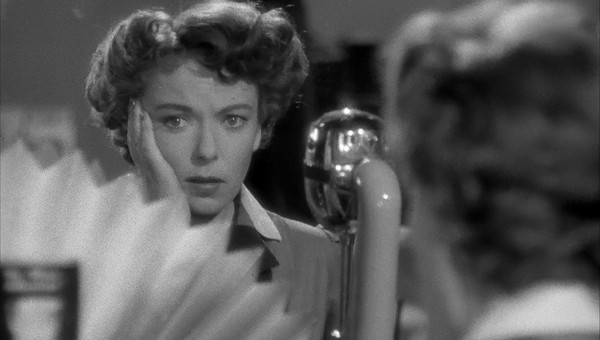dialogdekalog

Is this really a good movie or am I biased because Ida Lupino is in it? This is something I often have to ask myself. No other actress seems to have this effect on me. The thing about Ida Lupino is her austerity - her acting is so serious, so strict - though not minimalist - that she's able to take the cheesiest of plots and make it somewhat plausible, down to earth.
Last night I’ve watched Woman In Hiding, a 1949 film directed by Michael Gordon, a director best known for Pillow Talk, that naughty 1960 movie where Rock Hudson and Doris Day get real dirty together. Well, while Pillow Talk is all about Gordon playing with Hollywood's moral panic when it comes to sex, in Woman In Hiding he takes a step away from the industry's narrative limitations.
It's a subtle rebellion, of course. The plot still seems to be pushed by the typical noir chain of events, where one twist sets the motion for the next 15 minutes of film, only to be followed by another even more shocking twist. However it is between attempted murders, decisive phone calls and impulsive bus rides that we get the feeling that something else is doing the movement altogether.
See, the movie is about Ida Lupino's husband, played wonderfully by Stephen McNally, trying to use her to get whatever he wants. He kills her father, convinces her to marry him and eventually sabotages the brakes of her car, leading to an accident that looks like a suicide attempt. She jumps out of the car on the last second (the drama!) and runs away. Her husband's last hope is to track her down and convince everyone she's crazy so she can have her institutionalized.
What really drives the film from there on is how Ida embodies a constant sense of panic. Her character's feelings, her experience of recent trauma and her fear of being stalked is the greater force that holds the story over an overwhelming abyss of angst. After being able to find a job in another town, she realizes one of her customers is reading a magazine with her picture on it. Her husband is offering 5000 dollars to anyone that can find her. In the middle of the café, Ida starts to have a panic attack. Suddenly we're inside her feelings.
She stops in front of a mirror and glances at whatever's behind her, only to realize everyone is looking at her - or at least that's how she's feeling. The movie is no Bunny Lake is-she-or-is-she-not kind of psychological thriller, we’re not played to believe she really is going insane. What happens though is that Gordon makes the bold decision to keep it real, to not validate any presumed invincibility expected from Hollywood heroes. He explores her vulnerability, making a very forward portrait of post-traumatic stress. There’s no Scarlett O’hara under a tree swearing to overcome whatever is against her. We’re watching a human paralyzed by anxiety, perhaps the most mundane of emotions.
Through the next half hour or so there’s romance and a glimpse of hope. Ida meets a working class man, someone who isn't ambitious, someone who’s only driven by a purpose of doing the right thing. He believes she really needs help and gets her to her husband, who finally take her away. Some more twists and turns happen and Ida and her new love get back together, free at last. Her unfinished business is now to prove herself alive, sane and married to a murderer.
The movie eventually climaxes at what now appears to be almost a prototype of Vertigo's plot - the husband tries to get her to fall from an industrial stairway on her late father's factory. Here, where one would have hoped for a dramatic score, we're met by the absence of music. For a good 5 minutes or so, the mechanical movement of machinery sets the tone of the action, a pure diegetic nightmare mimicking the rhythm of a raced heartbeat. Hollywood suddenly goes into the 21st century, goes totally dogma 95: action presented as a real-time event.
What's also curious about this sequence is that Ida's character is locked inside the factory with her husband and his lover. There seems to be no escape from this ever-growing absurdity, a sensorial prison. Her hiding attempts were unsuccessful and her isolation led to an even worst faith. When her saviour manages to break into the factory, the score starts to play at last. Gordon’s time machine takes us back to Old Hollywood's, the fantasy realm where genuine love is possible, where salvation comes after you. Only 20 years later we would see the star of an irrevocable break from the stylistic chains of Old Hollywood’s industry, but here we are in 1949, peaking through the edges of something else american cinema could achieve. What privilege.
Dec 28th, 2019